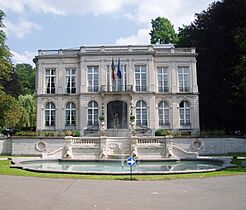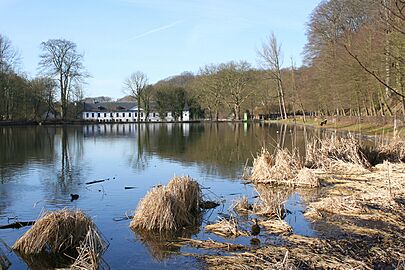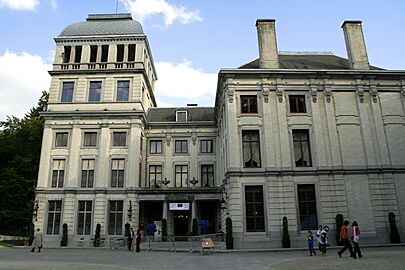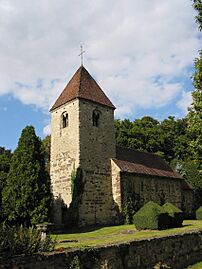Auderghem facts for kids
Quick facts for kids
Auderghem
|
|||
|---|---|---|---|

Château Sainte-Anne
|
|||
|
|||
| Country | Belgium | ||
| Community | Flemish Community French Community |
||
| Region | Brussels | ||
| Arrondissement | Brussels-Capital | ||
| Area | |||
| • Total | 9.03 km2 (3.49 sq mi) | ||
| Population
(2018-01-01)Lua error in Module:Wd at line 1575: attempt to index field 'wikibase' (a nil value).
|
|||
| • Total | Lua error in Module:Wd at line 1,575: attempt to index field 'wikibase' (a nil value). | ||
| Postal codes |
1160
|
||
| Area codes | 02 | ||
| Website | www.auderghem.be www.oudergem.be |
||
Auderghem (pronounced 'OH-der-gem' in French) or Oudergem (pronounced 'OW-der-khem' in Dutch) is one of the 19 towns in the Brussels-Capital Region of Belgium. It is located in the south-eastern part of Brussels. The town is found along the Woluwe river valley and at the start of the large Sonian Forest.
Auderghem shares its borders with other towns like Etterbeek, Ixelles, Watermael-Boitsfort, and Woluwe-Saint-Pierre. It also touches the Flemish towns of Tervuren and Overijse. Like all towns in Brussels, Auderghem uses both French and Dutch as official languages. Even with busy roads and increasing traffic, Auderghem has kept many of its beautiful natural and historical places. These include small rivers, the Rouge Cloître Abbey and its art center, the Priory of Val-Duchesse, the Château of Three Fountains, the Château Saint-Anne, and St. Anne's Chapel.
Contents
History of Auderghem
For many centuries, Auderghem was part of a bigger area. It was joined with two other forest villages: Watermael and Boitsfort. In 1794, during the French Revolution, soldiers decided to split these three villages into separate towns.
Later, in 1811, Napoleon I decided to bring the three villages back together. He made a special order to reunite them into one single area. However, Auderghem was soon removed from this union by a royal decision. This left Watermael-Boitsfort on its own.
Because of this, Auderghem officially became its own independent town in 1863. At that time, it was quite small, with only about 1,600 people living there.
Modern Times and Growth
Auderghem started to become more modern when a railway line was built. This line connected Brussels to Tervuren. In 1910, the Boulevard du Souverain (also known as Vorstlaan) was constructed. These changes helped the town grow quickly, and its population increased a lot.
In 1956, an important meeting took place in Auderghem. Paul Henri Spaak, a Belgian politician, led a conference at the Château of Val-Duchesse. This meeting helped prepare for the Treaties of Rome in 1957. These treaties were very important because they led to the creation of the European Economic Community and Euratom in 1958. These groups were the start of what is now the European Union.
People of Auderghem
As of 2004, many Japanese people who live in Brussels as expatriates (people living outside their home country) make Auderghem their home.
Main Places to See
Auderghem has several interesting places to visit, even though some are not always open to the public.
- The Priory of Val-Duchesse
This beautiful priory was a gift from the Belgian King. It is usually not open to the public. In 1963, important Belgian government ministers met here. Their discussions helped set up the idea of dividing Belgium into different regions and language areas.
- St. Anne's Chapel
This chapel has a very long history, going back to the 12th century. It is also not open to the public. In 1843, it was no longer used as a chapel and was sold many times. However, it still has amazing sculptures from the Middle Ages and beautiful old furniture that you can admire.
- Green Spaces
Auderghem is also known for its many green spaces. These parks and natural areas offer a chance to enjoy nature within the town.
Famous People from Auderghem
- Léon Huygens (1876–1918), a talented painter.
- Odette De Wynter (1927–1998), the first woman notary (a type of lawyer who deals with legal documents) in Belgium.
Schools in Auderghem
Auderghem has a variety of schools for students, including public, religious, non-religious, and international schools.
Public Secondary Schools (French Community)
- Athénée royal d'Auderghem
Religious Secondary Schools (Subsidized)
- Centre scolaire St-Adrien Val Duchesse
- Institut St-Julien Parnasse
- Ecole Sainte-Bernadette
- Institut Dominique Pire
Non-Religious Secondary Schools (Subsidized)
- De l'autre côté de l'école
Private International Schools
- The Japanese School of Brussels
See also
 In Spanish: Auderghem para niños
In Spanish: Auderghem para niños







